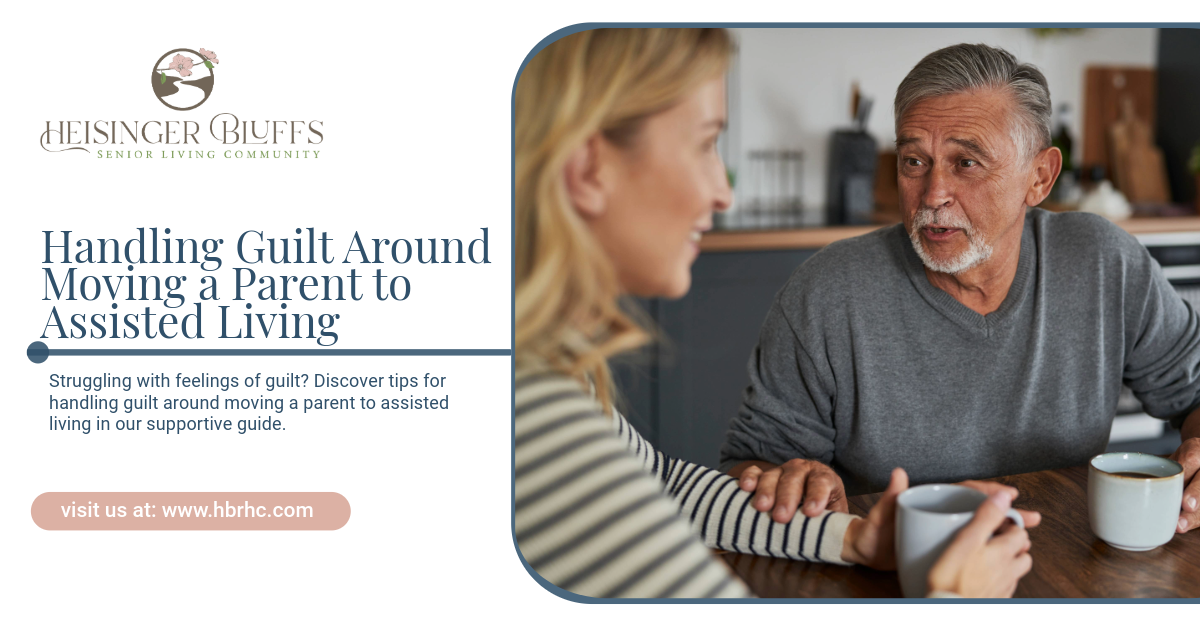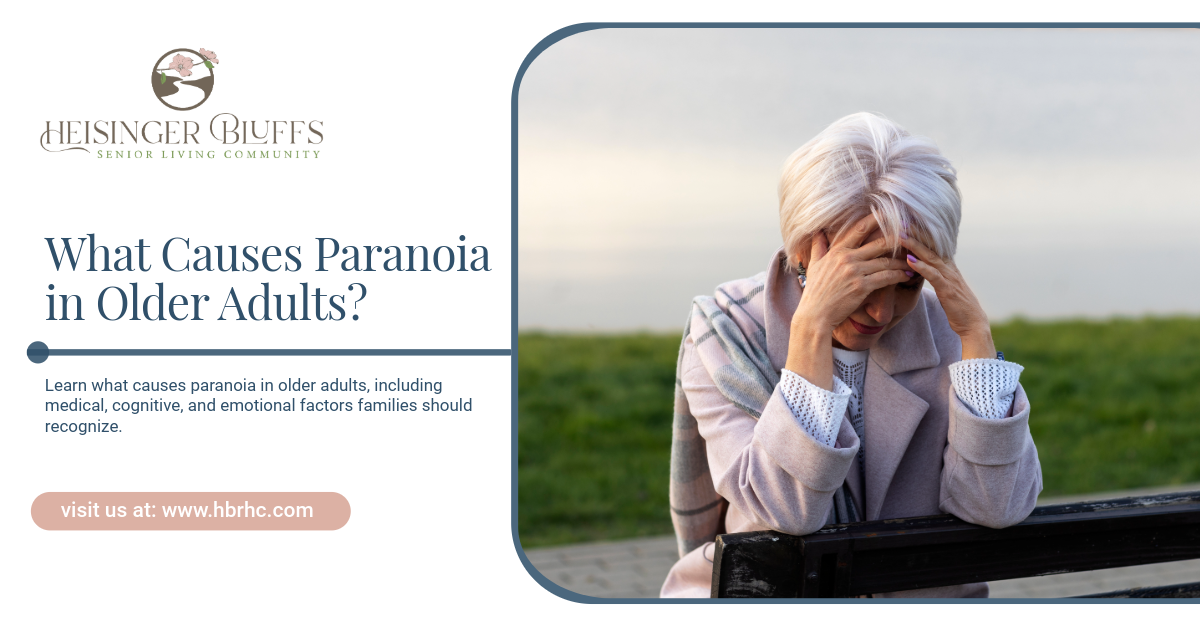Handling Guilt Around Moving a Parent to Assisted Living Community

Key Highlights
- Understanding caregiver guilt: It’s common for adult children and family members to feel remorse when transitioning parents to an assisted living community.
- Recognising normal emotions: Acknowledge guilt as a typical part of the decision-making process regarding assisted living facilities.
- Evaluating signs of necessity: Consider safety concerns, declining health, or the need for a higher level of care to ensure quality of life.
- Prioritizing self-care: Avoid caregiver burnout by seeking support from groups, professionals, or other family members.
- Healthier family dynamics: Relinquishing caregiving responsibilities may improve family bonds and foster better emotional health for all involved.
Choosing to move a parent into assisted living is not easy. Many adult children feel sadness and also feelings of guilt when they have to make this choice. It can hold a heavy place in the heart. Some may have self-doubt or worry about doing what’s best, even if the move is made for good reasons. But these changes in senior living are important. They help keep parents safe and healthy, and offer a better quality of life that can be hard to get at home.
It's good to know that all these emotions are normal. If you face them and talk about them, they can help you move forward in a better way. You don't need to carry all that stress or think about regret. This can make the process easier for you and your family.
Why Do We Feel Guilty About Moving a Parent to Assisted Living?
Guilt can come up when family roles change. You might feel bad when you do not keep promises to care for a loved one. There is also a sense that you let them down. Cultural expectations can make these feelings stronger. All this can make it hard to see that moving a parent to a new place is sometimes needed to help with their well-being.
The Emotional Weight of Changing Family Roles
Changing family roles can bring up many tough emotions. Some of these are sadness and feelings of guilt. When adult children step into the role of caregiver, everything can feel different. The tasks and what is expected from each person change a lot. Adult children now go from being cared for to giving care, especially in an assisted living setup. This new life can really change how you see yourself and how your family connects. Taking on this role as a caregiver means you have to understand the emotional strain, but it can also help the family get stronger and grow together.
Breaking Promises and Cultural Expectations
Starting the move to assisted living can be tough for many families. There are often strong cultural expectations and old promises that say family members should care for each other at home. Adult children might feel a deep sadness when they think they are not keeping these promises. These thoughts can bring up strong feelings of guilt. This mix of feelings can make things even harder. By understanding what is happening inside, adult children and family members can work through these feelings. This can help everyone have a better mindset while roles shift. In the end, the main goal is to help improve the quality of life for their loved ones.
Recognizing the Signs That Assisted Living Is Needed
There are a few signs that can show when someone might need assisted living. Safety is a big reason. If a person has trouble with things like bathing, getting dressed, or remembering to take medicine, they may need a higher level of care. Health getting worse and falling often can also make it not safe to live alone. Family members or adult children who give home care can get tired or stressed out. This is called caregiver burnout. Noticing these changes is important. It helps make sure their parent has good quality of life in a place with support.
Safety Concerns and Declining Health
The choice to move a parent to an assisted living facility often happens because of growing worries about safety and visible health problems. Parents may have trouble moving around. They could also have trouble thinking clearly or have long-term health problems. All these things make it hard for them to live on their own. When families notice these changes, they can look at different senior living options that will fit the new level of care their parent needs. Picking a senior living community with a strong focus on safety can help take away some feelings of guilt. It lets families know they are working to keep their parent’s quality of life as high as possible.
Caregiver Burnout and Its Consequences
Exhaustion from always being a caregiver can have serious effects. It can make you feel sad or drained and can hurt your body. When a caregiver gets burned out, there is often a feeling of deep sadness. They may also think they are not doing a good job. This can change the level of care given to a loved one. It is important to spot signs of burnout early. If not, it can make family tension worse and lower the quality of life for both the parent and the caregiver. Getting a break and asking for help can make a big difference. This way, both people can do well and be happier in an assisted living place.
Healthy Ways to Cope With Guilt During the Transition
Dealing with feelings of guilt in this time can be hard. Many adult children feel guilt when going through change, so know you are not alone. Remember that guilt is something most of us have in these moments. Talking to support groups can help. In these groups, you can share your feelings and get advice from other people who know what you’re going through. This will help take some of the weight off your shoulders. Try to put your attention on the good things this choice brings. For example, your parent can have better safety and a higher quality of life. This can help you, them, and the whole family feel more at ease, and make the change a bit easier for all of you.
Accepting That Guilt Is a Normal Emotion
Making the choice to move your parent to assisted living can be hard. Many adult children feel feelings of guilt about it. It helps to know this feeling is normal and can happen to other people too. When you see guilt as a normal thing, it can make it a bit easier to handle. It is important to remember that keeping your parent’s quality of life and safety first may mean you have to make hard choices about senior living.
Going through these feelings helps you be kinder to yourself. When you allow yourself some care, you and your family members can see this change to a senior living community in a better way. This time may be tough for all of you, but taking care of your parent’s needs is always important.
Seeking Support from Others Who Understand
Connecting with other people who have the same experiences can help lower feelings of guilt when moving a parent into an assisted living facility. Support groups for adult children making these tough choices give a safe place to talk about emotions, share stories, and learn from others. Meeting with these groups helps people feel that they are not alone and lets them share tips on how to handle the stress. Knowing that many others go through the same problems can help people accept their feelings and make it easier to go through this change with their parent into assisted living.
Final Thoughts
Deciding to move a parent to assisted living can bring up difficult emotions, especially guilt—but these feelings are normal. They often stem from personal values and cultural expectations. Recognizing this is the first step toward making peace with your decision. It’s also important to watch for signs that assisted living may be needed, such as safety concerns or caregiver burnout. Seeking support from loved ones or professionals can help you feel more confident and less alone.
Ultimately, choosing assisted living is a loving decision focused on your parent’s well-being. If you're considering the next step, Heisinger Bluffs is here to provide compassionate support and expert guidance. Reach out today to learn how we can help.
Frequently Asked Questions
What can I do to help my parent adjust emotionally after the move?
To help your parent feel better after the move, talk with them about how they feel. It is good to set up routines so things feel more normal for them. Try to get them involved in things with other people so they can make new friends. Regular visits from you can also make things easier for them and bring some comfort during this time.
How often should I visit my parent in assisted living?
How often you visit depends on what your parent needs and like. Try to see them often so you can stay close. But think about what social things they do and the new friends they have. Find a balance so they feel you are there for them, but you also need to look after your well-being.
Are there ways to stay involved in my parents’ care after the move?
You can stay involved in your parents' care after they move by visiting them often. Take part in care planning meetings and talk openly with the staff. When you spend time with your parent doing activities together, it can help you both feel closer. This help them know you are there for them and you care.
Sources:
- https://www.usatoday.com/story/life/health-wellness/2021/07/08/children-caregiving-aging-parents-feel-anger-stress-frustration/7901360002/
- https://www.ncoa.org/article/the-top-10-most-common-chronic-conditions-in-older-adults/
- https://www.mayoclinic.org/healthy-lifestyle/stress-management/in-depth/caregiver-stress/art-20044784











